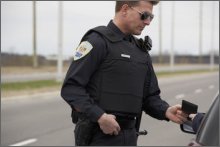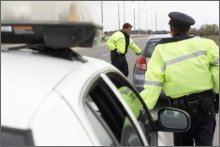Are Traffic Penalties in the Nation Increasing, and Do They Actually Save Lives?
by www.SixWise.com
Between 25 million and 50 million traffic tickets are issued
in the United States every year, estimates the National Motorists
Association, bringing in billions of dollars. Costs of these
tickets, like costs for fuel, vehicles and insurance, are
rising, leading to steep penalties in most states.
|

Routine traffic tickets can cost from $75 to $300 or
more depending on the state.
|
In Illinois, for instance, new laws were put in place in
2005 to keep drivers from speeding in construction zones.
Under the enhanced penalties:
-
First-time work zone speeders would be fined $375 ($125
of that would go to pay off-duty State Troopers to provide
added enforcement in construction or maintenance zones)
-
Two-time offenders would be fined $1,000, including a
$250 surcharge to hire Troopers, and the loss of their
license for 90 days
-
Drivers who hit a worker are subject to up to a $10,000
fine and 14 years in prison
The tickets can even be issued by mail, as specially equipped
vans were introduced to take photographs of speeding drivers.
Drivers in Hawaii may also face higher penalties this year.
Lawmakers are looking to introduce a 50 percent surcharge
on traffic fines to give county police departments millions
of dollars to recruit and retain officers. In 2004 alone,
Hawaii collected $15.8 million in traffic fines. Based on
this amount, a 50 percent surcharge would bring in $7.9 million.
And, according to a report from the Chief Justice's Commission
on Indigent Defense in Georgia, the state's traffic penalties
may be "by far the harshest in the nation." First
offenders can face up to a $1,000 fine and a year in prison
for any moving violation. Thirty-three states impose only
fines for a person's first speeding offense, while a few other
states limit jail time to six months. Fines for routine traffic
citations in most states range from $75 to $300 or more.
Do Traffic Tickets Save Lives?
Most would generally agree that most of the traffic stops
and fines, as inconvenient and frustrating as they may be,
would be worth it if they actually saved lives. Traffic accidents
kill more than 1 million people, and permanently disable another
25 million, worldwide each year.
So Donald A. Redelmeier of the University of Toronto and
Robert J. Tibshirani of Stanford University conducted a study
of more than 10 million licensed drivers in the Canadian province
of Ontario to determine if traffic tickets actually do make
a difference.
"We looked at the month prior to a fatal accident, and
the number of traffic convictions, and then the same month
in the year before," said Tibshirani, a statistician.
"What we found was that there were fewer tickets in the
month before a fatal accident than there were a year before,
and that suggests there's a protective effect of having a
ticket."
|

Traffic citations caused fatal accidents to decrease
by 35 percent, according to one study.
|
The researchers found that fatal accidents declined by 35
percent because of traffic citations. It appears, then, that
people do drive more carefully after receiving a ticket. However,
the cautious driving only lasted for a maximum of four months
after the ticket, the researchers pointed out -- then driving
went back to normal.
Most People Agree They Should Have Been Pulled Over
As it turns out, most drivers stopped (almost 84 percent,
according to a nationwide survey) thought they had been stopped
for legitimate reasons. Only 1 percent of the nearly 17 million
drivers pulled over in 2002 felt that police had used or threatened
excessive force.
Do You Know the Speed Limit?
The 2002 nationwide survey found that speeding was the most
common reason why people were pulled over, accounting for
nearly 55 percent of traffic stops. Although certain states
may vary slightly, speed limits on U.S. roads are typically
as follows:
-
25-30 mph on residential streets in cities and towns
-
35-45 mph on major arterial roads in urban and suburban
areas
-
50-65 mph on major divided highways inside cities
-
45-65 mph on rural two-lane roads
-
55-70 mph on non- Interstate highways and rural expressways
-
65-75 mph on rural Interstate highways
If you would like details on specific limits for your state,
the Insurance Institute for Highway Safety has up-to-date
speed limit information.
Top Traffic Safety Tips
You can avoid being pulled over in the first place by being
a safe, defensive driver. This means staying alert, concentrating
on the task at hand, and following the tips below:
-
Always wear your seatbelt
-
Obey the speed limit -- don't drive too fast or too slow
-
Avoid tailgating
-
Don't be an aggressive driver
-
Use your turn signals when you're changing lanes, and
be sure to turn your head and check the blind spot
-
Stay in your lane, don't drift over the line
-
Allow other drivers to merge safely
-
Stop completely at stop signs
-
Don't block intersections
-
Don't drink and drive
Recommended Reading
The
Safest & Least-Safe Cars of 2006
What
to Do & Know if You Are in an Auto Accident (Includes
a Checklist Everyone Should Print Out)
Sources
Illinois
Department of Transportation
The
Honolulu Advertiser: Traffic Fines May Cost Up to 50 Percent
More
Fulton
County Daily Report
ABC
News: Do Traffic Tickets Save Lives?